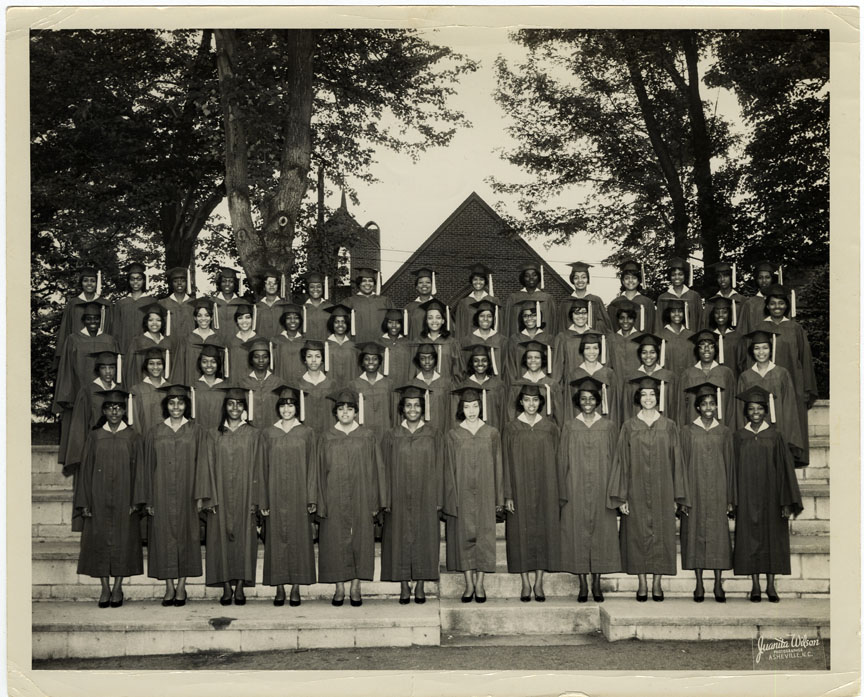On June 1, 1910, a fire destroyed Zion Methodist Church on College Street. As firefighters responded to the conflagration, its spreading flames threatened the nearby Allen High School, a private, all-black, female institution (known then as the Allen Industrial School). The fire was ultimately contained, but the school’s near destruction, wrote The Asheville Gazette News, “has called attention to the history of that important institution.”
Launched in 1887, the school operated until 1974. Early accounts state that initial classes were held inside a livery stable. But in 1897, an Englishwoman named Marriage Allen donated $1,000 (roughly $31,000 in today’s dollar) for the construction of a proper school.
The Allen High School was regularly featured in local papers throughout its 87-year run. Student plays, musicals and sporting events made headlines, as did the school’s participation in social issues.
For example, on Feb. 13, 1933, The Asheville Citizen reported on a series of talks held at the school concerning race relations. “Progress of the colored people,” the paper wrote, “and a better feeling among all races as a thing indispensable for world peace and welfare” were among the matters addressed.
Despite these community sessions, injustices and cruelties toward people of color continued throughout the United States. According to the Equal Justice Initiative, more than 4,400 African Americans were lynched in the South and other regions of the country between the years of 1877 and 1950.
During the Jim Crow era, educational opportunities also remained scarce for many black Americans. On Jan. 25, 1942, the Sunday edition of the Asheville Citizen-Times reported that the Allen High School was one of only three private accredited secondary schools for African Americans in the state. Meanwhile, the paper continued: “Of the 27 counties in Western North Carolina only seven have accredited high schools for negroes. Seven have non-standard high schools while the others have no negro high schools.”
The Allen High School, the 1942 article stated, “was a definite need,” not only for local residents but also for students in surrounding areas. According to the paper, of the 53 girls living at the school, 28 came from nine of the state’s western counties, while 19 students arrived from other North Carolina counties or adjoining states. The remainder, the article continued, were from elsewhere.
Integration ultimately led to the school’s closure in 1974. That year, 10 girls graduated from Allen High, bringing the school’s total number of graduates to 1,177.
Four years later, in 1978, the Allen High School Alumnae Association hosted its first high school reunion. The Asheville Citizen previewed the gathering in its Aug. 13, 1978, edition. According to the paper, about 400 former students were expected at the event, including Annis Bradshaw Pearson, class of 1915, the school’s oldest surviving member.
Celebrating the school’s successes, the 1978 article named several of its prominent former students:
“Graduates of Allen include Evelyn Williams McKissick, wife of Soul City developer Floyd McKissick; Dr. Sheila Wright, opthalmologist; Amelia Parker, administrative assistant to White House Press Secretary Jody Powell; Dr. Jean Bright, a retired professor at A&T State University in Greensboro and author of several books; and recording star Nina Simone, a former resident of Tryon.”
On Sept. 30, 1978, in a letter to the editor alumnae associates Margaret Johnson and Ann Woodford thanked reporter Henry Robinson for calling attention to the gathering, writing:
“This historic and unprecedented event not only had a great effect on the community of Asheville, but has also reached out nationally. With the very professional help of Mr. Robinson, we were able to let Asheville and its alumni know that a landmark of Asheville will not die and be clouded in a blanket of dust.”
Today, the school’s former buildings are used as offices, including Explore Asheville Convention and Visitors Bureau.
Editor’s note: Peculiarities of spelling and punctuation are preserved from the original documents.





Henry Robinson was the first African American reporter of the Asheville Citizen, in 1969 (if memory serves).